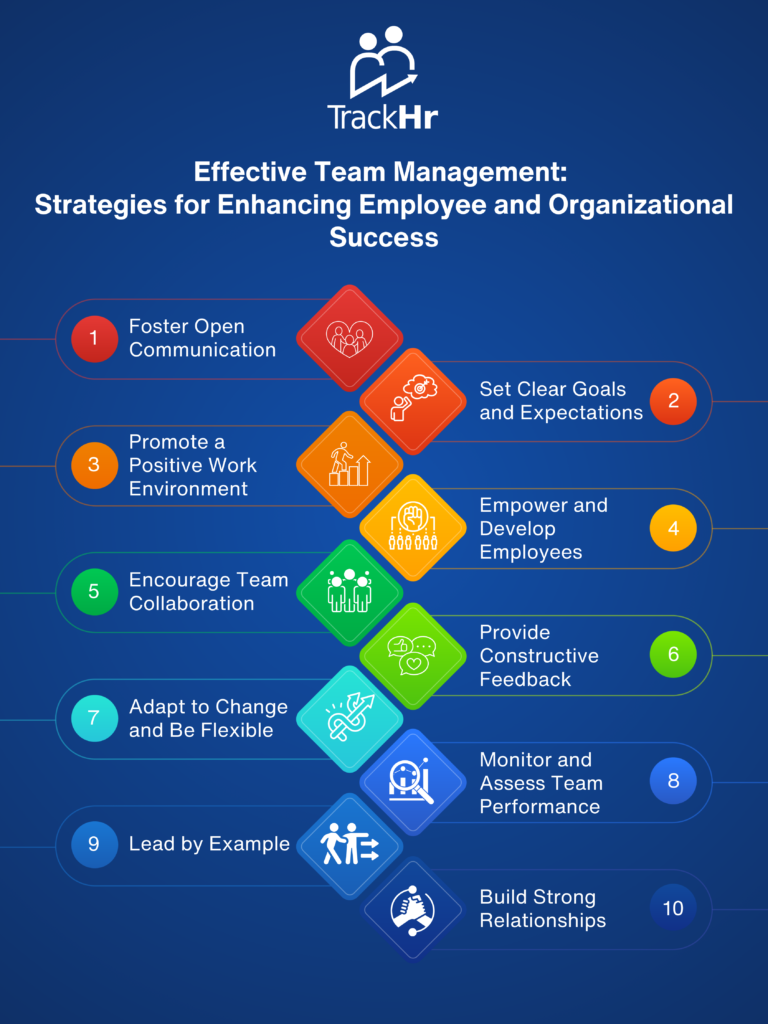Tuesday, 29 May 2024
Effective Team Management: Strategies for Enhancing Employee and Organizational Success
Managing a team within an organization is a multifaceted challenge that requires a blend of leadership, communication, and strategic planning. Properly managing a team not only enhances employee satisfaction and productivity but also drives the overall success of the organization. Here, we explore key techniques to effectively manage a team for the betterment of both employees and the organization.

1. Foster Open Communication
Effective communication is the cornerstone of successful team management. Leaders should establish open channels of communication, encouraging team members to share ideas, feedback, and concerns without fear of reprisal. This can be achieved through regular team meetings, one-on-one check-ins, and the use of collaborative tools. Transparent communication helps in building trust, aligning team goals, and swiftly addressing any issues that arise.
2. Set Clear Goals and Expectations
Clearly defined goals and expectations provide direction and purpose for the team. Managers should ensure that each team member understands their roles and responsibilities, as well as the overarching objectives of the organization. Utilizing SMART (Specific, Measurable, Achievable, Relevant, Time-bound) goals can help in setting precise and attainable targets. Regularly reviewing and adjusting these goals keeps the team aligned with the organization’s evolving priorities.
3. Promote a Positive Work Environment
A positive work environment boosts morale and fosters a sense of belonging among employees. Managers can cultivate such an environment by recognizing and rewarding achievements, providing opportunities for professional development, and maintaining a healthy work-life balance. Encouraging collaboration and celebrating diversity within the team also contributes to a supportive and inclusive workplace.
4. Empower and Develop Employees
Empowerment involves giving team members the autonomy to make decisions and take ownership of their work. This can be facilitated by delegating responsibilities appropriately and providing the necessary resources and support. Additionally, investing in employee development through training programs, workshops, and mentoring can enhance their skills and confidence, ultimately benefiting the organization.
5. Encourage Team Collaboration
Team collaboration is essential for innovation and problem-solving. Managers should promote a culture of teamwork by organizing collaborative projects, team-building activities, and cross-functional initiatives. Encouraging the sharing of knowledge and expertise helps in leveraging the diverse strengths of team members, leading to more effective and creative solutions.
6. Provide Constructive Feedback
Regular and constructive feedback is vital for continuous improvement. Managers should provide feedback that is specific, actionable, and focused on behavior rather than personal attributes. Constructive feedback helps employees understand their strengths and areas for improvement, guiding their professional growth and enhancing their performance.
7. Adapt to Change and Be Flexible
The ability to adapt to change is crucial in today’s dynamic business environment. Managers should be flexible and open to new ideas, adjusting strategies as needed to meet changing circumstances. This adaptability not only helps in navigating uncertainties but also encourages a culture of innovation and resilience within the team.
8. Monitor and Assess Team Performance
Regular monitoring and assessment of team performance are essential to ensure that goals are being met and to identify any areas that need attention. Using performance metrics and key performance indicators (KPIs) provides objective data to evaluate progress. Regular performance reviews and feedback sessions help in keeping the team on track and making informed decisions.
9. Lead by Example
Leadership by example is a powerful way to inspire and motivate a team. Managers should demonstrate the behaviors and attitudes they expect from their team members, such as integrity, accountability, and a strong work ethic. Leading by example sets a standard for the team to follow and fosters a culture of excellence.
10. Build Strong Relationships
Building strong, positive relationships with and among team members is fundamental for effective team management. Managers should take the time to understand each team member’s strengths, motivations, and career aspirations. Developing personal connections helps in creating a cohesive and motivated team that is committed to the organization’s success.
Conclusion
Effective team management is integral to the success of both employees and the organization. By fostering open communication, setting clear goals, promoting a positive work environment, empowering employees, encouraging collaboration, providing constructive feedback, adapting to change, monitoring performance, leading by example, and building strong relationships, managers can create a productive and harmonious workplace. These strategies not only enhance employee satisfaction and engagement but also drive organizational growth and achievement.
